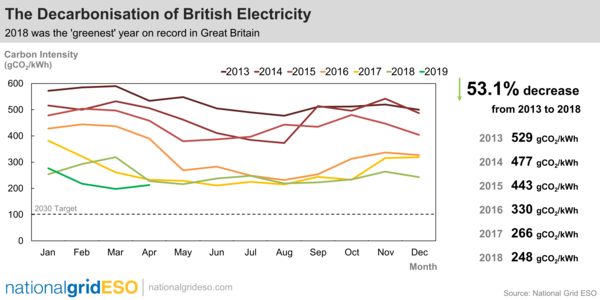
- Sustainable Planet -
- 4mins -
- 265 views
Coal-Free Fortnight: UK sets landmark record as UK power stations go two weeks without fossil fuel
Great Britain has not used coal to generate electricity for two weeks – the longest period since the industrial revolution.
Coal-free fortnight: Landmark record set as UK power stations go two weeks without the fossil fuel
As of May 31, coal had not been burnt in the UK power stations for a fortnight as Britain hit a new clean energy record by generating electricity without the polluting fossil fuel for a full two weeks. The new record marks the longest period that coal has not helped power Britain since the 1880s.

UK did not use power from coal for two weeks in May—the first time since industrial revolution
UK energy supplier National Grid announced on May 31: ‘We can now confirm that Great Britain’s electricity system will pass the fortnight mark for no coal generation this afternoon! The last coal generator came off the system at 3.12pm on 17th May – meaning we will achieve #coalfreefortnight at 3:12pm today!!’
This means Great Britain did not need coal, considered a highly polluting way to produce electricity, for 336 hours.
Britain enjoyed more coal-free hours last month (679 hours) than it did for the whole of 2017 (624 hours). Its first coal-free day was in April 2017.
The government say they plan to phase out the UK’s last coal-fired plants by 2025. Producing power without coal is the ‘new normal’, the National Grid said when the one week record was smashed earlier last month.
Powering Britain instead of coal were nuclear, solar, wind, gas and wood pellets, according to National Grid.
Source: DailyMail

Great Britain records fortnight of coal-free electricity generation
The system which supplies electricity across England, Scotland and Wales went for two weeks without coal at 3:12pm BST precisely, May 31, according to the National Grid Electricity System Operator.
The latest landmark comes less than a month after Britain’s first week without coal, underlining the dramatic decline in its use in recent years.
Coal has been used for electricity generation since 1882, when a plant opened in Holborn, London.
However in 2018 coal made up just 5% of Britain’s electricity generation, a big decline from about 40% in 2012, according to figures from the Department for Business, Energy and Industrial Strategy.
Coal has mainly been replaced by natural gas, which produces less than half the carbon dioxide emissions.
Renewable sources with no direct carbon emissions, such as solar and wind power, accounted for 28% of electricity generation in 2018, say power company Drax.
The British record for solar power has also been beaten this month—On 14 May the country generated 25% of its power from the sun.
Modelling by the Intergovernmental Panel on Climate Change suggests that coal use for energy generation globally will have to be reduced to close to zero in every scenario in which global temperature increases are limited to 1.5°C.
Seven coal-fired power stations remain in use in the UK, mainly as backups during cold periods when energy demands are high. The Cottam plant in north Nottinghamshire will close in September, after owners EDF Energy said it was no longer economical to run it.
The government last year revealed plans to shut down all coal-fired power stations by 2025, but it has come under pressure to accelerate the transition away from fossil fuels after parliament declared a climate emergency at the beginning of May.
Source: TheGuardian

The statistics from Current-News.co.uk—The UK Power Industry’s Online Trade Magazine
Having only gone a week without coal for the first time since the Industrial Revolution earlier last month, May 2019 has proven to be a halcyon moment for the country’s energy market.—reported Current-News.co.uk, online trade magazine to the UK power industry.
Indeed, National Grid also confirmed that the grid witnessed more coal-free hours in May than in January, February and March combined and, at 624 hours so far, more than in 2017 in total.
Market conditions have also made for a particularly volatile time on the UK’s spot market, with power prices dipping into the negative for a record-breaking nine consecutive hours last weekend, sending balancing costs spiralling to £6.6 million for just one day.
That led one energy firm to describe the events as “extraordinary”, as eleven hours of negative pricing in one 24-hour period sent average wholesale market prices to around -£12/MWh.
This has also had a lasting effect on the last week’s average energy price, which current sits at just £28.04/MWh. In comparison, the average energy price for the same period last year was more than double that at £57.57/MWh.
The record has also meant for an interesting fortnight for the UK electricity system’s carbon intensity. According to figures compiled by Drax Electric Insights, the average carbon intensity of the UK’s power system for the past fortnight has stood at around 179g CO2/kWh, significantly lower than average but still someway behind the country’s 2032 target of 100g CO2/kWh.
Dustin Benton, policy director at think tank Green Alliance, said the record was evidence of coal becoming obsolete.
“By 2025, the UK will not only see coal power plants shut permanently, but also periods without any fossil fuelled electricity at all.
“This is not just a British story. The lesson for coal companies worldwide is that clean energy, efficiency and demand response are both cheaper and better. The lesson for governments is that it’s past time to plan a just transition for workers in the fossil fuel industry: clean energy jobs are the future.”
Jack Dobson-Smith, spokesperson at the Solar Trade Association, echoed Benton’s comments, arguing that coal was becoming just a “bit player” in the UK electricity mix.
“Solar has certainly played a significant part, with this month also seeing the solar generation peak record tumble. We can expect many more coal-free days in the future, and solar’s contribution to these will rise with an anticipated 4-7GW set to be deployed over the next four years, with no need for subsidy. This transition to a clean energy future is essential if we are to tackle the climate emergency, and rising investment in solar will drive green jobs and skills for years to come,” he said.
Source: Current-News.co.uk

